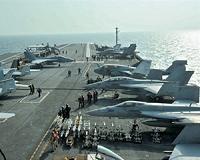| . |  |
. |
Irbil, Iraq (UPI) Dec 7, 2010 Iraq's two main Kurdish parties, which have long sought an independent state in their northern enclave, are building their own army and intelligence apparatus as the country remains gripped by political crisis stemming from inconclusive elections in March. On Oct. 20, amid the political power struggle to form a coalition government, Barham Salih, prime minister of the Kurdistan Regional Government, extended his administration's powers to establish his direct control of the enclave's security and intelligence services. The Kurdistan Democratic Party is led by Mustafa Barzani, president of the KRG, and the PUK is headed by veteran guerrilla chief Jalal Talibani, Iraq's president. Salih set up a body known as the Council of the Assiyeh, which will function as a Kurdish security council. It will be headed by Karim Sanjani and Korsat Rasul, military chiefs for the KDP and the PUK. Kurdish sources say the two parties' 80,000 fighters, known as peshmerga -- Those Who Face Death -- will be welded into a single Kurdish army of eight divisions. Intelligence Online, a Paris Web site that covers security issues, reports that the process will be overseen by Jaafar Sheik Mustapha, the minister for the peshmerga. "He is being advised by several Israeli consultants," it said. Mustafa Barzani reportedly met in Vienna in January with Danny Yatom, former head of Israel's foreign intelligence service, the Mossad, "who has been tipped to coordinate the military merger." The Mossad and private Israeli defense companies with links to Israel's defense ministry have long been reported aiding the Kurds, an on-off relationship that goes back four decades. The U.S. military withdrawal is having a serious impact on Kurdish planning. The peshmerga, sworn enemies of Saddam's regime, were the Americans' most dependable allies during the 2003 invasion and the chaos that ensued. Now they find themselves losing a powerful ally at a time when the Iranian-backed Shiite majority has taken control of the defense and interior ministries, which direct the military and security forces. The peshmerga, many of them veterans of a long insurgency against Saddam Hussein, remain relatively independent and powerful in the north. "Ultimately, whatever their organization status, they will retain ultimate loyalty to the Kurdish cause," the Texas global security consultancy Stratfor observed recently. "The Kurdistan Regional Government, realizing it is losing its security guarantor with the U.S. withdrawal and understanding the consequences of Sunni-Shiite interest aligning against them in a struggle between Kurds and Arabs, decided to form a unified Kurdish army to defend their autonomy." The International Crisis Group has warned that "the risk of the balkanization of the security force will likely increase" as the political crisis drags on. The Kurds have clung tenaciously to their ethnic identity, throughout the cruel years of Baathist rule, largely under Saddam and then in the often chaotic post-U.S. invasion years when their enclave became semi-autonomous under a federal government in Baghdad. The rebellious KDP and PUK set aside their often violent differences to help the Americans topple Saddam, who waged a genocidal war against them. Deep-rooted Kurdish nationalism apart, the move toward an independent army has been accelerated by the emergence of an Iraqi military controlled by Shiite leaders since Saddam was toppled. There are some 35,000 Kurds in the state army. To reduce KRG influence over Kurdish forces, Baghdad has deployed predominantly Kurdish brigades from the 2nd and 3rd Divisions to the south. It is these forces that will form the backbone of the planned Kurdish army. The central government in Baghdad, concerned at the KRG's military plans, has suggested absorbing another 30,000 pershmerga into the national army. But the KRG has rejected that, a decision apparently based on increasing concern that Kurdish forces will inevitably be pushed into open conflict with state forces over the oil-rich Kirkuk region. The Kurds claim the region is historically part of territory. During Saddam's rule, he drove out Kurds and Arabized the city. The Kurds, who see the oil fields as the economic core of an independent state, have been reversing that process since 2003. U.S. forces have kept the lid on the smoldering powder keg. But the fear is that it will eventually explode if no settlement has been reached once U.S. forces complete their withdrawal.
Share This Article With Planet Earth
Related Links News From Across The Stans
 Gates touts US air power role in Afghanistan war
Gates touts US air power role in Afghanistan warAboard Uss Abraham Lincoln (AFP) Dec 6, 2010 Defence Secretary Robert Gates on Monday told the crew of a US aircraft carrier that the ship's warplanes were dealing "lethal blows" to insurgents in Afghanistan. "When your aircraft come screaming, our troops hear the sound of relief and the enemy knows what's coming next," Gates told hundreds of sailors in a vast hangar on the USS Abraham Lincoln in the Arabian Sea. "You are deliverin ... read more |
|
| The content herein, unless otherwise known to be public domain, are Copyright 1995-2010 - SpaceDaily. AFP and UPI Wire Stories are copyright Agence France-Presse and United Press International. ESA Portal Reports are copyright European Space Agency. All NASA sourced material is public domain. Additional copyrights may apply in whole or part to other bona fide parties. Advertising does not imply endorsement,agreement or approval of any opinions, statements or information provided by SpaceDaily on any Web page published or hosted by SpaceDaily. Privacy Statement |